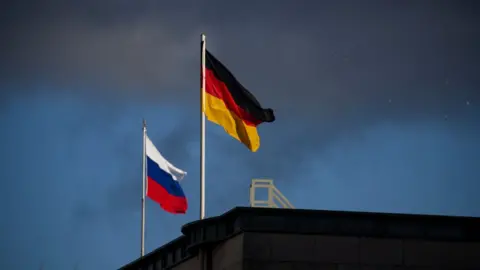Hundreds of expelled Germans set to leave Russia
 Getty Images
Getty ImagesHundreds of Germans working in the education and cultural sectors will be expelled from Russia next month, the German foreign ministry says.
It confirmed media reports that Russia had decided to cap the number of German employees from the start of June.
They include teachers at the German school in Moscow and staff at the Goethe Institute cultural association.
The move follows tit-for-tat expulsions of diplomats and increasingly strained relations between Russia and Germany.
Last month, Russia and Germany each declared 40 employees of their respective embassies personae non gratae - or unwelcome - and expelled them.
German daily newspaper Süddeutsche Zeitung newspaper reported that the latest move will affect a "low-to-mid three-digit number" of employees, including diplomats.
"In view of this unilateral, unjustified and incomprehensible decision, the Federal Government is now concerned with ensuring a minimum presence of intermediaries in Russia while also maintaining a diplomatic presence," the newspaper quoted the German foreign ministry as saying.
In making a decision on the maximum number of Russians in Germany, the ministry said it would aim at ensuring real balance in practice.
Several EU countries have expelled Russian diplomats since the start of the war in Ukraine. More than 40 diplomats suspected of spying were issued expulsion orders from four EU countries in March 2022.
Russia and Germany used to share deep economic and cultural links, which have been strained in the wake of Russia's full-scale invasion of Ukraine.
Within days, Chancellor Olaf Scholz revolutionised Germany's foreign policy by boosting military spending and committing to send weapons direct to Ukraine.
Mr Scholz kept his promise. When, in January, Germany announced it would send Leopard 2 tanks to Ukraine, Russia accused it of abandoning its "historical responsibility to Russia" arising from Nazi crimes in World War Two.
Undeterred, earlier this month, Mr Scholz vowed to back Ukraine "for as long as it is necessary", promising €2.7bn (£2.4bn) worth of weapons.
Germany also worked hard to end its dependency on Russian gas thanks to a frantic buying operation from other countries and the record-time building of its very first import terminal for liquified natural gas (LNG).
With the expulsion of diplomats and cultural and education employees, the remaining ties between Russia and Germany are set to be put under yet more strain.
